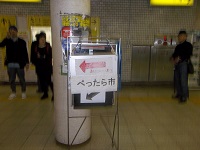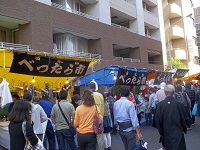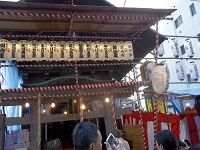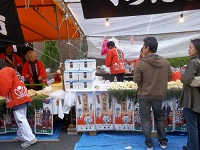There are one or two places where everyone says, "I'm worried about it all the time, but the timing is bad ...." For me, this "Betara City" was one of them. I wish I could finally go to the 19th of today, the first day.
 I was quite excited since I got off at Kodemmacho Station. You can see the sign and the person in charge of happi coat at Exit 3. As soon as you turn left along the guide street, the entrance of the city. Look at the stalls and the offering Kirisansho shop sideways and first visit Hoda Ebisu Shrine. This street is lined with Betazuke shops. The voice of calling a plate for tasting in one hand also excites the "festival" feeling.
I was quite excited since I got off at Kodemmacho Station. You can see the sign and the person in charge of happi coat at Exit 3. As soon as you turn left along the guide street, the entrance of the city. Look at the stalls and the offering Kirisansho shop sideways and first visit Hoda Ebisu Shrine. This street is lined with Betazuke shops. The voice of calling a plate for tasting in one hand also excites the "festival" feeling.
You can also see the names of Tamasaburo and Kikugoro in the dedication Japanese lantern.
Oh! There's also a rakugo storyteller. There is also a traditional portable shrine in Temmacho.
Well, I'll have to buy some pickles.
 I decided to sample several houses and buy them from the vigorous Onisan. 1,500 yen per bottle.
I decided to sample several houses and buy them from the vigorous Onisan. 1,500 yen per bottle.
As you know, this beta pickles are radish rice koji pickled with offering in the Ebisu-ko city of Hoda Ebisu Shrine in Otemmacho. It was in "Chuo-ku Monoshiri Encyclopedia" that the purchased radish came to be called "Bedarazuke" because it became sticky when it touched the clothes. This beta pickles became famous and the name of the city was "Betara City". It is said that the image of deity of Hoda Ebisu Shrine was worshiped by Ieyasu, Kanso Magome, who was village headman in Temmacho. Yes, do you know the origin of "Ebisu-ko"? October is said to be Kannazuki, and all the gods gather in Izumo, and only Ebisu-sama remains during that time. It is said that it occurred because of trying to comfort Ebisu who was left behind. (From "Japanese calendar and annual events") Bettara City is held for two days on October 19 and 20 every year. If you haven't come this year, please come and look forward to the autumn tradition next year.
At my house, we had dinner with new rice and long-awaited Betazuke. It is an autumn night when you feel that the last general Yoshinobu was also a favorite, saying, "I'm often born in Japan."



